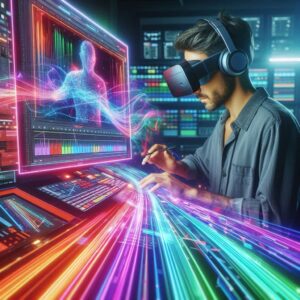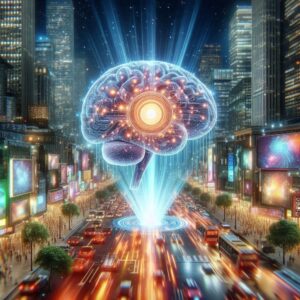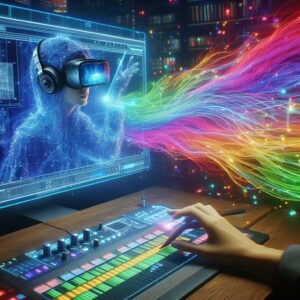Revolutionising Video Production with AI
Artificial intelligence (AI) has significantly impacted various industries, including video production. Incorporating AI technology has transformed video editing, creation, and production processes, increasing productivity and cutting costs. AI-powered video production uses advanced algorithms and machine learning techniques to automate various workflow stages, such as editing, content development, and post-production.
Thanks to this technological advancement, companies, content providers, and filmmakers now have more options for making professional-quality videos with little human involvement. The increasing influence of AI on the video creation sector will dramatically change how the sector operates.
Main Points
- AI is revolutionizing video production by automating tasks, enhancing creativity, and improving efficiency.
- AI transforms video editing by enabling automatic scene detection, object recognition, and content analysis.
- AI plays a crucial role in video content creation by generating personalized and targeted content through data analysis and predictive algorithms.
- AI significantly impacts video post-production by streamlining processes, reducing costs, and improving the overall quality of the final product.
- AI video production services offer advanced capabilities such as deep learning, natural language processing, and computer vision to enhance production and deliver high-quality results.
- The future of video production with AI is promising, with technological advancements leading to more sophisticated tools and capabilities.
- Embracing AI in video production brings benefits such as increased productivity, cost savings, and improved creativity, but also presents challenges related to data privacy, ethical considerations, and job displacement.
 How AI is Transforming Video Editing
How AI is Transforming Video Editing
Streamlining the Editing Process
AI-powered editing tools transform the video production industry by evaluating footage, identifying key areas, and modifying videos depending on predefined parameters. These techniques can identify facial expressions, emotions, and auditory cues, producing more exciting and dynamic editing. Furthermore, AI algorithms can assist with colour correction, audio enhancement, and visual effects, speeding up the editing process while reducing the time and resources required for manual editing.
Unlocking Creative Possibilities
AI also enables video editors to discover new creative options. For example, AI may assess existing video content to provide fresh and innovative editing concepts, providing editors with new insights and creative inspiration. This may result in unusual and captivating video material that appeals to audiences.
Personalizing the Viewing Experience
Furthermore, AI-powered editing tools can assist in customising videos based on audience preferences, resulting in a more tailored viewing experience. As artificial intelligence advances, video editing is expected to become more intuitive and efficient, allowing creators to focus on storytelling and creativity while AI handles the technical aspects.
The Role of AI in Video Content Creation
AI has also greatly impacted video content creation, enabling artists to create high-quality videos on a larger scale. Creators can automate video content creation with AI-powered content production tools that employ machine learning algorithms to assess data and generate intriguing narratives. These techniques can identify patterns in massive datasets, insights, and visual components that can be used to create captivating video content.
Furthermore, AI can help to automate the scripting process by creating scripts based on predefined parameters and audience preferences. This saves time and allows for creating personalised and targeted video content. Furthermore, AI has enabled the creation of hyper-personalised video content through data-driven insights.
Producers can use AI to evaluate user behaviour and preferences to guarantee that their video content reaches its intended audience. Businesses that employ video content for marketing experience a boost in conversion rates and viewer engagement with this level of customisation. In this approach, artificial intelligence has substantially enhanced video content creation, making it more efficient, customized, and scalable. It enables artists to create high-quality videos that appeal to many viewers.
The Impact of AI on Video Post-Production
In addition to editing and content creation, artificial intelligence has significantly impacted video postproduction procedures. AI-powered postproduction systems can automate audio syncing, captioning, and metadata tagging to improve productivity and accuracy. These programs can evaluate audio tracks and automatically sync them to video footage, saving editors time and effort.
Furthermore, AI can generate accurate video captions using speech recognition algorithms, making them available to hearing-impaired viewers. This improves these people's watching experience and illustrates AI's inclusiveness in video post-production. Furthermore, AI can scan video content and automatically identify and categorise data, making it easier to manage and search for specific footage during post-production. Furthermore, artificial intelligence has enabled the development of strong visual effects and CGI (computer-generated imagery) techniques that were previously time and resource-expensive.
AI-powered technologies enable producers to build realistic visual effects and CGI elements more efficiently, producing higher overall movie quality. These advancements have opened up new creative possibilities for filmmakers and content creators, enabling them to bring their visions to life more swiftly and precisely. As AI advances, post-production techniques are anticipated to become more streamlined and complicated, increasing the quality and impact of video content.
 AI Video Production Services: What You Need to Know
AI Video Production Services: What You Need to Know
As artificial intelligence (AI) continues to disrupt the video production industry, various AI-powered video production services have emerged to fulfil the growing demand for automated and efficient production processes. These services include video editing, content generation, post-production, and dissemination. AI video creation services provide various advantages, including faster turnaround times, lower costs, and more significant creative potential.
These adaptive services allow artists to make high-quality videos with little personal intervention, thanks to solid algorithms and machine-learning methodologies. We also want to make our AI video-production services accessible to many people, from solitary producers to businesses, and simple to use. They frequently have intuitive interfaces and configurable options, recognising that each user has unique video production requirements.
Several AI video production companies also provide cloud-based solutions, enabling seamless collaboration and remote access to video production tools. This flexibility enables creators to work successfully from anywhere worldwide while using AI to optimise production processes.
The Future of Video Production with AI
Enhanced Editing and Content Creation
Advancements in deep learning algorithms may enable AI to understand and interpret complex visual elements more accurately, leading to more precise editing and content creation capabilities.
New Creative Possibilities with VR and AR
We may see the integration of AI with virtual reality (VR) and augmented reality (AR) technologies, opening up new creative possibilities for immersive storytelling.
Democratization of Video Production
As AI becomes more widely available and affordable, we may see a democratisation of video production capabilities, allowing a broader range of producers to create high-quality videos with fewer resources. Furthermore, new industry standards and best practices for exploiting AI will emerge as AI becomes more integrated into video production workflows. This will lead to increased collaboration between AI engineers and video production specialists, as well as the development of specialised tools and solutions customised to the industry's specific requirements.
 Embracing AI in Video Production: Benefits and Challenges
Embracing AI in Video Production: Benefits and Challenges
Using AI in video production has various advantages for consumers and businesses. AI has the potential to alter video production and viewing in various ways, including higher efficiency and cost reductions, improved creative talents, and customized content creation. Modern algorithms and machine learning technologies allow producers to streamline workflows, automate boring tasks, and focus on storytelling and creativity.
However, incorporating AI into filmmaking brings its own set of challenges. One of the most pressing problems is ensuring AI-powered goods are used ethically and responsibly. As AI increasingly integrates into video creation, creators must consider the ethical implications of using automated tools that may jeopardise privacy, bias, or misinformation.
As AI becomes increasingly involved in video production, there is growing concern about job displacement. However, this should not overwhelm the importance of creators approaching AI integration with caution and accountability. Their influence over the future of video production is critical, and their decisions will define how AI affects the industry.
Artificial intelligence has significantly impacted the video production industry, leading to increased productivity, cost savings, extended creative possibilities, and customised content development. To keep up with AI's rapid evolution, producers must exhibit caution and accountability when introducing AI into their workflows. They must also be aware of any ethical implications and issues, ensuring that the benefits of AI are maximised while the hazards are minimised.
FAQs
What is AI-generated video?
AI-generated video uses artificial intelligence (AI) to create or manipulate video content. This can include generating realistic human faces, altering existing video footage, or creating new video content.
How does AI-generated video work?
Artificial intelligence-generated video analyses and manipulates visual data using machine learning techniques. Video footage can be created or modified using deep learning, computer vision, and generative adversarial networks (GANs).
What are the applications of AI-generated video?
AI-generated video has numerous applications, including special effects generation in the entertainment sector, personalised video content in marketing, medical imaging analysis in healthcare, and video surveillance and facial recognition in security.
What are the potential benefits of AI-generated video?
AI-generated video has the potential to reduce video production costs, provide highly realistic and personalised video content, improve efficiency in tasks such as video editing and analysis, and open up new creative possibilities in video creation.
What are the concerns surrounding AI-generated video?
Some issues with AI-generated video include the possibility of misuse, such as creating fake news or fraudulent video material, ethical questions about privacy and permission, and the possible impact on established video production sectors.
References
The Transformative Impact of AI on Video Production | Paint Room X. https://paintroomx.com/24848-the-transformative-impact-of-ai-on-video-production-17/
Mensah, G. A. (2024). Artificial Intelligence and Ethics: A Comprehensive Review of Bias Mitigation, Transparency, and Accountability in AI Systems. https://doi.org/10.62839/ajfra/2024.v1.i1.32-45
The post Using AI to Transform Video Production appeared first on Ezi Gold.
The post A Revolution in Video Production Driven by AI appeared first on Ai Ninja Toolbox.
The Article A Revolution in Video Production Driven by AI Was Found On https://limitsofstrategy.com
Comments are closed